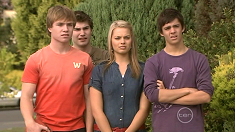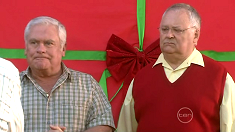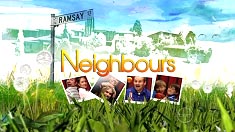|
.
Interviews
> Megan Herbert
After starting out as a script coordinator nine years ago, Megan Herbert has since worked on the show in numerous roles, including scripting many of the key episodes in the Karl/Susan/Izzy triangle. After 18 months writing for the residents of Walford and Holby, Megan is back at Neighbours and here she shares her thoughts on the show's success...
Can you give us a background on your career and involvement in the television industry prior to Neighbours?
I started as the Script Coordinator at Neighbours in 2000, my first ‘real’ job since completing my journalism degree the year before. Prior to that, my involvement in the television industry consisted of the ownership of a very old, very broken TV set which served as an ideal stand for my pot-plants. To this day, I am one of those rare individuals who has no idea who killed Laura Palmer because simply put, I never watched TV back then. I recognize now that I was incredibly lucky to land that first foot-in-door role at Neighbours. It opened up a whole world for me.
How did that first job at Neighbours come about? Were you a fan of the series before joining the crew?
I was, like the rest of Australian youth, a big fan of the show in the late 80s. As fortune had it, my Mum worked selling advertising space in TV Week at the time. The glamorous perks this afforded our family included the intermittent influx of TV Week promotional goods (our coffee mug shelf looked like a billboard graveyard) and a weekly pre-press copy of the magazine, the day before it hit news-stands no less. Each week my sister and I would wait at the door for the hallowed manuscript and quite literally wrestle each other to the ground for the right to the centerfold poster. We hoped it would be a Kristian Schmid or Rick Alessi. It was usually the Blakeney Twins or “Cuddly” Phil Martin. In subsequent years, my interest in TV waned. Too busy chasing skater boys, no doubt. Many years later, when I was inhabiting the no man’s land between university and the real world, I received a tip-off about a storylining job from my dear friend, Marieke Hardy, who had recently left the in-house team to pursue freelance writing. I applied, participated in a one week trial on the team (to this date, the most peculiar job interview experience of my life), and, due to my utter lack of experience, was rejected for the position. But Jude Colquhoun, who was Script Producer at the time, saw potential in me and kindly offered me the role of Script Coordinator. I had absolutely no idea what that was, but I accepted the job, and never looked back. Once I was in there, I knew I’d found the industry for me. I rediscovered my love for the show very quickly and worked my way up from there.
You worked in various roles on Neighbours, including scriptwriter and script producer between 2000 and 2007. Could you tell us a little about the various jobs you’ve had on the show and the processes involved?
It all started with the six months in the Script Coordinator’s chair. It was an incredible education as I literally spent five days a week immersing myself in storylines and scripts. As a Script Coordinator, you’re the first one to read a script when it comes in to be formatted, and the last one to wave it goodbye as it is released to studio for rehearsal. You are privy to every stage of the production process from the birth of the storylines, to each of the edit stages, all the way through to the offline edits which we would watch together at lunchtime. I was basically being paid to learn everything there is to learn about making television drama, learning what works and what doesn’t, how production constraints affect storytelling, how to make a run of the mill dramatic scene into a show-stopper. I was reading the work of some of Australia’s best script writers day in and day out and watching what our very skilled editors did to them to make them even better. It was the best way to learn the trade. After six months in the coordinator’s chair, I reapplied for a storylining role. This time, I was successful. Shortly thereafter I completed a script submission, which landed me a spot on the writer’s list. I was a storyliner for 18 months but was fast discovering that my true calling was writing dialogue. When a script editing position opened up, I grabbed the opportunity with both hands. From there, I worked my way up to Senior Script Editor (which I think is called Supervising Script Editor these days).
|

|
Who were your favourite Neighbours characters to write for, and why?
It’s not individual characters that I find fun to write for, but rather combinations of characters. For example, a scene with Karl and Susan is ALWAYS going to be a joy to write, whether the topic is an extra-marital affair or the need for a new dishwasher. In contrast, a scene with Karl and some guy selling pharmaceuticals is never going to write itself. Good dialogue happens when well-loved characters with strong, recognizable voices bounce off one another, falling into a rhythm of trademarked banter, or vicious sniping, or coy flirtation. If you can get into that rhythm, and also manage to make it sound naturalistic instead of scripted, then you are on your way. Some of my favourite character combinations over the years include Karl and Susan (whether in love or in turmoil, they go together like fat kids and cake), Libby and Steph (girlie chats are so very important to the soap genre), Toadie and Tim Collins (it’s arch, it’s camp, it’s fabulous), Izzy and Karl (particularly when he was playing dim-witted lothario to her bumbling femme fatale), any combination of Timminses, the more the merrier, and Steph and Max because they were as close to a perfect couple (flaws and all) as anything I’ve ever seen. There are also a number of characters who have that special ability to lift any scene from drab to fab. Sindi Watts, Valda Sheergold, and Gino Esposito are three that come to mind. In recent times, the new gang of teens that has sprung up – Declan, Bridget, Donna, Ringo, Zeke and Rachel – all provide excellent fodder. Donna in particular prompts some wonderfully ditzy dialogue. Callum is wonderful to play with and I think that both Elle and Lucas prompt very sparky exchanges.
You’ve been responsible for numerous popular episodes, including Karl finding out that Izzy lied about their baby, and the London episodes in which Karl and Susan remarried. Do you have any scenes or moments you wrote that you were particularly pleased with?
When you’re commissioned to write one of the ‘big’ episodes like the denouement of a long-running affair or a spectacular pyrotechnic stunt, you rub your hands together gleefully in anticipation of the thrills, spills, bitch-fights and soap-slaps that inevitably come with the territory. I’ve found over the years, however, that these car-crash episodes are often more fun to watch than to write. Certainly complex emotional scenes between classic characters are a treat and the ones you listed were no exception. I wrote the London episodes while freelancing in Australia, but by the time they went to air in the UK, I was living there and it was a real treat to watch them on the Beeb in a north London warehouse. But I have to say it’s the smaller, less flashy, classic Neighbours moments that I really enjoy writing most. Like Steph and Toadie’s gentle transition from friends to lovers, or the rekindling of Number Thirty friendships when Lance made a reappearance for the 20th Anniversary week. There are a few scenes coming up I really enjoyed writing… in particular, the reignition of a relationship after a very long burn… stay tuned!
You were responsible for the scripting of episode 5261 – A New Beginning, featuring Rosie and Frazer’s wedding, and the arrival of the Parker family. This episode was publicised as the beginning of Neighbours going ‘back to basics’ – did you feel any pressure because of this? Was there a deliberate change in tone, or was it just like scripting any other episode for you?
I really loved writing that script. But that was more due to the excellent mix of stories than the relaunch. Ringo and Carmella pashing in the hotel pool, Frazer walking at his wedding, and introducing a bunch of new characters; those sorts of stories are always fun. There was a certain element of awareness that the episode was getting a lot of publicity due to the relaunch but that didn’t affect the way I approached the writing of it. The trick with those ‘blockbuster’ episodes (births, deaths, marriages) is trying to squeeze everything in; twenty-three minutes never seems long enough.
|

|
How important do you think the core characters - for example, Harold, Lou, Karl, Susan etc - have been to the series over the years?
Without the core characters, Neighbours would just be a procession of attractive teenagers having discussions about teenage concerns. Although teen characters are important to entice younger audience members and to keep the show fresh, our core cast – usually of the parental and grandparental variety – provide the show with its intergenerational element which I think is Neighbours’ greatest strength and the secret to its success. Our core cast also gives the show a consistency and a familiarity that keeps fans coming back year after year. If I had a dollar for every person I’ve met over who claims to have never watched Neighbours, but can still do a passable impression of a befuddled Harold Bishop, then I would be flying first class instead of cattle. But I don’t. So I’m not. More’s the pity. Characters like Harold, Lou, Karl, Susan, and Toadie set the tone for the show and furnish the stories with history. It’s extremely doubtful that Neighbours would still be going strong after 24 years without them.
What do you think are the strengths and weaknesses of the Neighbours format?
Neighbours is at its best when it is a well balanced machine - when teen stories are set against adult stories, and there is high drama, but enough comedic or quotidian moments to keep things grounded in reality. And like most machines that work well, there is a system at play and a formula used in striking this balance. It’s a formula that takes into consideration the time and budget constraints of production, the demands of networks, and the desires of the audience and it’s a formula that the in-house team knows and understands extremely well. And to a certain extent, the loyal fans keep coming back year after year because they’ve come to rely on this formula; they depend on its familiarity. I have found that you can travel to any part of the world and if Neighbours comes up in conversation, someone present will either break into the theme song or start firing off questions about Kylie Minogue. Which is really remarkable when you think about it. That instant recognition factor should not be underestimated as it tells us that people all over the world, at various stages of their lives, have connected with the Ramsay Street family as though it was their own. The flip-side of this familiarity is the danger of repetition. After 24 years, there are going to be some elements that repeat themselves and this can mean that people dismiss the show (and soaps in general) as a mind-numbing, formulaic, outmoded form of storytelling. While it is true that Neighbours is never going to be a 24 or a Dexter or a Heroes, I think it is pointless to even make the comparison between a soap opera and newer formats. They are very different creatures. But as far as serial drama goes, I think Neighbours does what it does better than anyone else.
How important is the comedy in Neighbours, in your opinion? Is it something that you’re particularly conscious of when writing for the show?
Comedy is incredibly important to the story-telling in Neighbours, for the primary reason that Neighbours stories are very real and very human. They’re not all about explosions or terrorist plots, they’re about how human beings react when their hearts are broken, or what they say and do when they fall in love with their best friend’s boyfriend. In real life, when we deal with such issues, it’s not all angst and arguments. Sometimes, we need to lose ourselves in laughter just to prevent the onset of tears. So we inject humour into situations to help us get through. It’s no different in Neighbours. The humour is used sparingly and, I think, to great effect. I am very conscious of adding humour to any episode I write where I can. The trick though, is to make it sound and feel natural, and to use it as a way to balance out the more dramatic moments.
What have you enjoyed most about your involvement with Neighbours?
When I worked in-house, the people I met not only taught me everything I know about writing for television, they also became lifelong friends. We shared a love for the show and recognized how lucky we were to be paid actual money to help make it. When I left the in-house team to write on a freelance basis, those feelings (and friendships) remained despite my reduced contribution to the day to day workings of the show. In early 2007 I took a year and a half away from Neighbours when I moved to the UK to work in-house at EastEnders and then Holby City. Now, having left London, I’m happily back freelancing for Neighbours again. I am loving reconnecting with the show as I think it is going through a particularly strong phase at the moment, with a good mix of characters and some very solid, classic-Neighbours-style stories in circulation. But without a doubt, working in-house, despite the incredibly long hours and hard work, is the most fun. When you are living and breathing the show you really feel a part of it. I look back on my in-house days very fondly indeed.
|

|
What do you think accounts for the huge success Neighbours has continued to enjoy over the past 24 years?
First and foremost, the people who work for the show are what makes it a success. That may sound like stating the obvious, but I’m not sure the average viewer understands just how much hard work and love and care, from so many individuals, goes into making a single episode of a show like Neighbours. It is a truly collaborative affair and every person’s contribution is vital for it to work and be a success. Secondly, it is the dramatic and tonal balance Neighbours strikes that accounts for its success and longevity. That and its consistency. And despite having grown up, and changed its wardrobe, and updated its theme song over the years, it has stayed true to the formula that made it so popular in the first place.
What have you been doing since you last worked at Neighbours in 2007, and what's next for Megan Herbert?
As I mentioned above, after a stint working in the UK, I am back writing for Neighbours on a freelance basis again, and enjoying it a great deal. I have recently relocated to Reykjavik, Iceland, where I am writing and illustrating a children’s book and spending many hours soaking in Reykjavik’s glorious thermal hot-tubs. What can I say…? It’s where I get all my best ideas.
If you've enjoyed this interview and would like to discuss it with other fans, click here
Interview by Steve. Added on 18th April 2009
Back
|

